How to Install Composer on Ubuntu 16.04 LTS?
Introduction
Composer is a dependency manager that is used to manage application packages. It is used for PHP programming.
It was developed by Nils Adermann and first released on 2012.
Composer can be described as an application-level dependency manager for PHP that offers a standard format to manage PHP software dependencies and needed libraries. It was designed by Jordi Boggiano and Nils Adermann, who continue to handle the project. In April 2011, they started development and first published it on 1 March 2012. Composer is highly inspired by Ruby's "bundler" and Node.js's "npm". The dependency solving algorithm of the project began as a PHP-based port of libzypp satsolver of OpenSUSE.
The composer executes from the terminal and installs application dependencies (for example, libraries). Also, it permits users to get PHP applications present on "Packagist", its primary repository having available packages. Also, it offers autoload abilities for libraries that describe autoload information to simplify third-party code usage.
Some benefits of Composer
Other areas are also available where the composer will aid us to improve your workflow. Here are some basic features:
- Composer integrates libraries quickly for our SaaS providers (stripe, twilio, opentok, aws, algolia, pusher, and several others). We need to get the package version and name, add them to our composer.json, and execute the install command.
- The composer has the ability to utilize built-in packages that resolve basic issues. We need to have a routing package. We can find routing in packagist and begin right away. We need to manage uploaded files. We can find the upload in packagist and begin right away.
- Autoload each of our classes with autoload of Composer https://getcomposer.org/doc/04-schema.md#autoload. Helpful to remove requires from our code.
- Customize our computer workflow using Composer scripts. We can run our scripts after/before the composer install, after/before the composer update, etc.
Syntax of Composer
Commands
Composer provides many parameters, such as:
- install: It installs every library with composer.json. This command is used to download every repository dependency of PHP.
- require: It includes the library into the parameter to the composer.json file and then installs it.
- update: It updates every library with composer.json according to the permitted versions specified inside it.
- remove: It uninstalls any library and deletes it using composer.json.
Supported frameworks of Composer
- The two and later versions of Symfony
- The four and later versions of Laravel
- The 3.0 and later versions of Codelgniter
- The 3.0 and later versions of CakePHP
- The 2.0 and later versions of FuelPHP
- The eighth and later versions of Drupal
- The 6.2 and later versions of TYPO3
- The 3.0 and later versions of SilverStripe
- The 2.0 and later versions of Magento
- The 1.1 and later versions of Yii
- Laminas
- Lumen (web framework)
- Silex (web framework)
- The one and later versions of the Adianti Framework
Versions of Composer
Composer versions vs. VCS (Version Control System) versions
The "version" term can be a bit ambiguous as the composer is highly geared toward using VCS, such as git. In a version control system, the "version" is a particular group of files that includes specific data.
In Composer, the string follows a package name within a require line. Actually, it is more particularly a version constraint. Besides, Composer utilizes version constraints to determine which refs it should be inspected in a VCS.
VCS Branches and Tags
- Tags: Composer normally deals with many tags. When we write any version constraint, it might refer to a specific tag or a valid tag range. To solve these constraints, Composer initially prompts the VCS to mention every available tag and creates the internal list of versions available according to these tags.
- Branches: If we wish Composer to find out a branch rather than a tag, we need to mark it as the branch with the special prefix, i.e., dev-*. If we are testing a branch, it is supposed that we wish to work on that branch, and Composer clones the repository into the proper place in our vendor directory. We need to simplify for Composer that we are trying to test out a branch but not a tag if branch names are the same as versions.
- Stabilities: Composer identifies stabilities, including RC, beta, alpha, dev, and stable, in which RC is short for release candidate. Version stability is specified by its suffix. If the suffix is unavailable, Composer takes that version as stable. In inclusion, Composer automatically includes a -dev suffix to every numeric branch and prefixes to every other branch shipped from a version control system repository using -dev. The dev stability gets assigned in both situations.
In this tutorial, we will install composer on Ubuntu. This process includes the following steps.
Prerequisites
- Ubuntu
- terminal Login
- PHP
Composer Installation
Use the following commands to download and install composer.
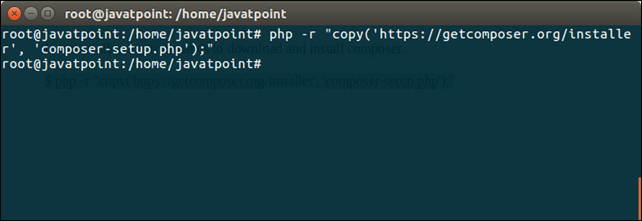
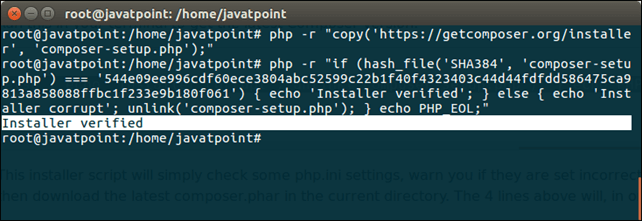
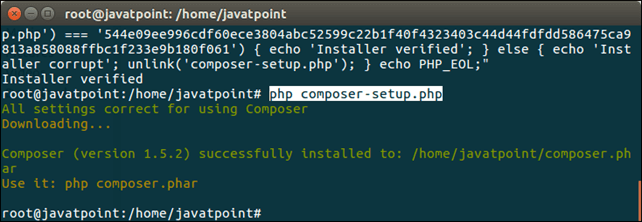
A file composer.phar is downloaded to the current directory.
Move and Rename Composer.phar
We need to move composer.phar file to the /usr/bin/ location to access it globally. Use this command.
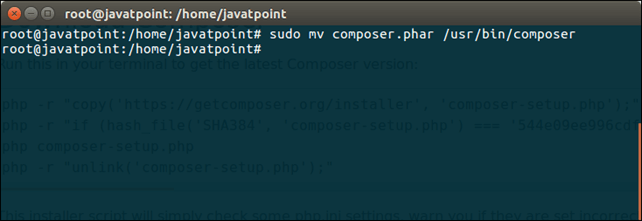
Well, composer has installed successfully, we can check it by typing composer to the terminal.
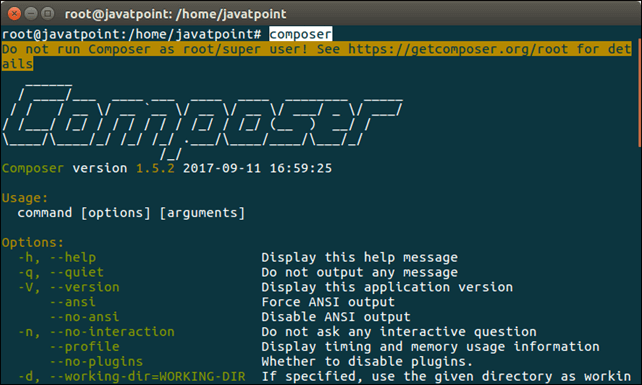
Now, we can use it to manage PHP application packages.
|





 For Videos Join Our Youtube Channel: Join Now
For Videos Join Our Youtube Channel: Join Now










